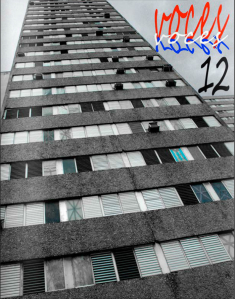 At nine in the evening of December 31, coinciding with the guns of the Morro of Havana and after the staging of poems by representatives of OMNI ZONA FRANCA, Voices 12, the digital magazine of the alternative Cuban blogosphere, was presented. 12 issues say goodbye to 2011 and welcome to the twelfth year of the 21st century.
At nine in the evening of December 31, coinciding with the guns of the Morro of Havana and after the staging of poems by representatives of OMNI ZONA FRANCA, Voices 12, the digital magazine of the alternative Cuban blogosphere, was presented. 12 issues say goodbye to 2011 and welcome to the twelfth year of the 21st century.
The 19 authors who weave the 62 pages of minimalist design based on silhouettes, lyric games, and urban images, start and end with poetry for Voices 12 said goodbye to the Poetry Festival Without End 2011 and inserted as a starter poems of omnizoneros Amaury Pacheco, Luis Eligio and Nilo Julián. Luis Felipe Rojas follows them with his personal Christmas card, Yoani Sanchez with the mini allegorical monologue, “It is not the same water,” and finally Orlando Luis Pardo, who startled with “The first day of never,” a kind of delirium that exudes erudition and poetic neurosis.
The middle is full of voices that cross the post of the remembrance, literary criticism, art, sports, sociology and film, without ignoring fiction, music or history. All moored in the coordinates of the island time and space, including, of course, books and characters that transcend the geographical environment.
Whoever gets the clip in vocesvocesvoces@gmail.com can read the 2 posts of the narrator and filmmaker Eduardo del Llano, followed by “The right to be myself and to write in Havana,” the stunning and uncensored Wendy Guerra; the lucid portrait “Anas Nin: Gender or death,” by the exiled journalist Armando de Armas; or continue with the habanero March Ramon Diaz, author of the story “The other,” before proceeding to review and reflections that diversify and spice the first issue of 2012.
With his “Evocation of Vaclav Havel“, Miguel Iturria Savon examines aspects of the life and literary work of the deceased Czech playwright and political, while Vincent Echerri gives us the itinerary of our national hero in his great love of big city: “In the Wake of José Martí in New York“; while the political scientist Manuel Cuesta Morua, author of “Those who thought half of Cuba,” suggests including the black ideologues in the national discourse.
Other artists of the country are revealed in Iris del Castillo (Cuban football outside revolutions), Armando Chaguaceda (Cuba: looks at an art critic) and Camilo E. Olivera (Reggaeton versus cultural policy?). Literary criticism is represented by two short and suggestive texts: Fraggle Rock Publishing, by Jorge E. Lage about the commentary of Osdany Morales published in the Spanish magazine Chimera, and Speaking in Silver, Regina Coyula on the book by José Antonio Ponte, Villa Marista in Silver, edited by Colibrí in 2010.
Almost in the style of Colofón a long cinematographic review with an undescribable title is inserted, from the writer and bodybuilder who signed with a pseudonym (Yoss), which alternates with numerous digressions with nice and sharp criticism of the Cuban feature film, Juan of the dead, by the talented and bold filmmaker Alejandro Brugues.
January 23 2012
